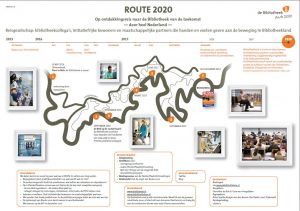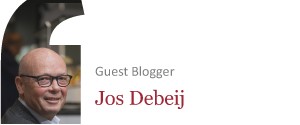Guest Blogger: Henriëtte de Kok, Tour guide Route 2020.
Digital developments, cost reductions and changing usage are external developments that influence the work of public libraries. The collective libraries of the Netherlands have decided to undertake actions to anticipate these trends. A budget has been provided to this end. To focus the effort, a number of topics has been concentrated upon. The fundamental idea is: by, for and through libraries.
- learning from each other and undertaking;
- cooperation and network development;
- collective positioning in relation to local financing.
Two travel teams got to work. One for the component of positioning and one for undertaking and cooperation.
The project, running to the end of 2017, got started under the title Route 2020. We chose the metaphor of the expedition, heading for the future together, we examine and discover, we share experiences. And periodically we meet each other physically at a stopping place. At Hilvarenbeek we focused on the theme of the ‘Places to bieb’. At Assen we discussed the library as entrepreneur and the social value of libraries.
The route for Action line 2: undertaking and cooperation started with an exploration by about fifty regional guides. They collected real-life examples from the entire country. Examples that have already proven their value. There are plenty of nice plans, but we were looking mainly for successful implementations.
In experimental gardens we investigate in what way the knowledge of the various subjects can be made transferable to fellow libraries. Themes that feature in this are:
- developing libraries into future-oriented organisations;
- platform for communities;
- all under one roof, multifunctional organisations;
- Places to bieb, the library is everywhere;
- a lifetime of learning;
- the free library;
- this is how the library works, HRM aspects.

Regularly we send the home front a postcard. We have found many small beautiful projects and campaigns during our exploratory phase. Too small for a substantial experimental garden, but worth the effort to share with our colleagues.
By means of biebtobieb the libraries are kept informed of our experiences and are invited to join the expedition interactively.
By the end of 2017 we will have the travel guide 100% libraries, and beyond that the expedition will surely continue.


